Bildung, Kompetenzen und Arbeitsmarkt
Die Forschungsgruppe erforscht die Entstehung und die Auswirkungen von Kompetenzen. Als wesentliche Bestimmungsfaktoren für die Entwicklung von Kompetenzen untersucht die Gruppe insbesondere den familiären Hintergrund, schulische Bildung und Weiterbildung am Arbeitsplatz. Effekte höherer Kompetenzen auf den Arbeitsmarkterfolg werden über die gesamte berufliche Laufbahn hinweg analysiert. Außerdem beschäftigt sich die Gruppe mit Veränderungen in der Nachfrage nach Kompetenzen infolge von technologischem und strukturellem Wandel.
Forschungscluster
Produktivität und InstitutionenIhr Kontakt

- Abteilung Strukturwandel und Produktivität
Referierte Publikationen
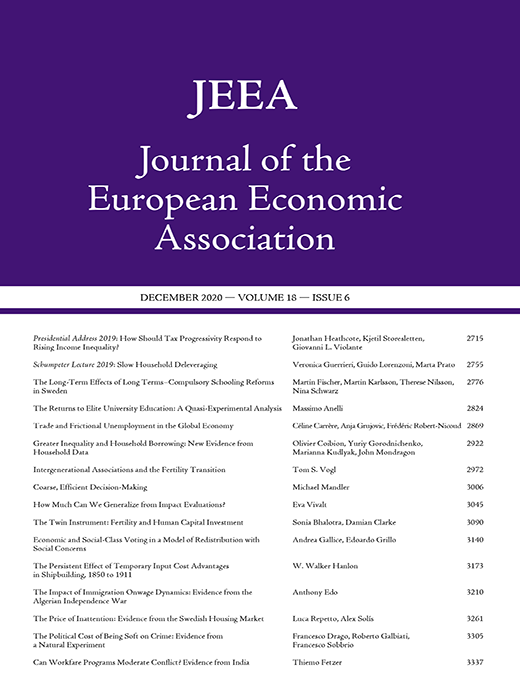
International Emigrant Selection on Occupational Skills
in: Journal of the European Economic Association, Nr. 2, 2021
Abstract
<p>We present the first evidence on the role of occupational choices and acquired skills for migrant selection. Combining novel data from a representative Mexican task survey with rich individual-level worker data, we find that Mexican migrants to the United States have higher manual skills and lower cognitive skills than nonmigrants. Results hold within narrowly defined region–industry–occupation cells and for all education levels. Consistent with a Roy/Borjas-type selection model, differential returns to occupational skills between the United States and Mexico explain the selection pattern. Occupational skills are more important to capture the economic motives for migration than previously used worker characteristics.</p>
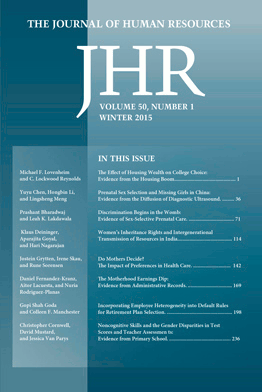
The Value of Smarter Teachers: International Evidence on Teacher Cognitive Skills and Student Performance
in: Journal of Human Resources, Nr. 4, 2019
Abstract
<p>We construct country-level measures of teacher cognitive skills using unique assessment data for 31 countries. We find substantial differences in teacher cognitive skills across countries that are strongly related to student performance. Results are supported by fixed-effects estimation exploiting within-country between-subject variation in teacher skills. A series of robustness and placebo tests indicate a systematic influence of teacher skills as distinct from overall differences among countries in the level of cognitive skills. Moreover, observed country variations in teacher cognitive skills are significantly related to differences in women’s access to high-skill occupations outside teaching and to salary premiums for teachers. </p>

Do Smarter Teachers Make Smarter Students?
in: Education Next, Nr. 2, 2019
Abstract
<p>Student achievement varies widely across developed countries, but the source of these differences is not well understood. One obvious candidate, and a major focus of research and policy discussions both in the United States and abroad, is teacher quality.</p>

Africa’s Skill Tragedy
in: Journal of Human Resources, Nr. 3, 2018
Abstract
<p>We study the importance of teacher subject knowledge for student performance in Sub-Saharan Africa using unique international assessment data for sixth-grade students and their teachers. To circumvent bias due to unobserved student heterogeneity, we exploit variation within students across math and reading. Teacher subject knowledge has a modest impact on student performance. Exploiting vast cross-country differences in economic development, we find that teacher knowledge is effective only in more developed African countries. Results are robust to adding teacher fixed effects and accounting for potential sorting based on subject-specific factors.</p>

Skills, Earnings, and Employment: Exploring Causality in the Estimation of Returns to Skills
in: Large-scale Assessments in Education, Nr. 12, 2017
Abstract
<p>Ample evidence indicates that a person’s human capital is important for success on the labor market in terms of both wages and employment prospects. However, unlike the efforts to identify the impact of school attainment on labor-market outcomes, the literature on returns to cognitive skills has not yet provided convincing evidence that the estimated returns can be causally interpreted. Using the PIAAC Survey of Adult Skills, this paper explores several approaches that aim to address potential threats to causal identification of returns to skills, in terms of both higher wages and better employment chances. We address measurement error by exploiting the fact that PIAAC measures skills in several domains. Furthermore, we estimate instrumental-variable models that use skill variation stemming from school attainment and parental education to circumvent reverse causation. Results show a strikingly similar pattern across the diverse set of countries in our sample. In fact, the instrumental-variable estimates are consistently larger than those found in standard least-squares estimations. The same is true in two “natural experiments,” one of which exploits variation in skills from changes in compulsory-schooling laws across U.S. states. The other one identifies technologically induced variation in broadband Internet availability that gives rise to variation in ICT skills across German municipalities. Together, the results suggest that least-squares estimates may provide a lower bound of the true returns to skills in the labor market.</p>
Arbeitspapiere
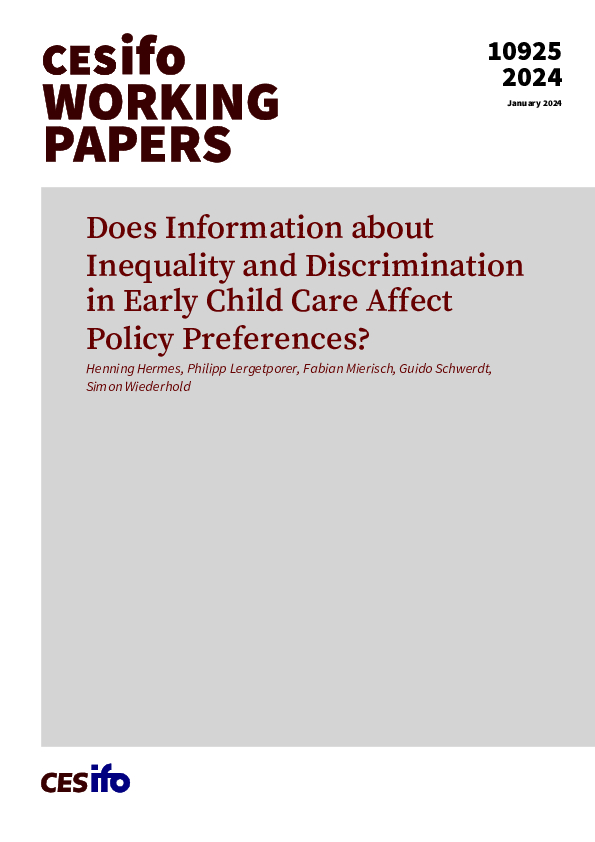
Does Information about Inequality and Discrimination in Early Child Care Affect Policy Preferences?
in: CESifo Working Paper, Nr. 10925, 2024
Abstract
We investigate public preferences for equity-enhancing policies in access to early child care, using a survey experiment with a representative sample of the German population (n ≈ 4, 800). We observe strong misperceptions about migrant-native inequalities in early child care that vary by respondents’ age and right-wing voting preferences. Randomly providing information about the actual extent of inequalities has a nuanced impact on the support for equity-enhancing policy reforms: it increases support for respondents who initially underestimated these inequalities, and tends to decrease support for those who initially overestimated them. This asymmetric effect leads to a more consensual policy view, substantially decreasing the polarization in policy support between under- and overestimators. Our results suggest that correcting misperceptions can align public policy preferences, potentially leading to less polarized debates about how to address inequalities and discrimination.
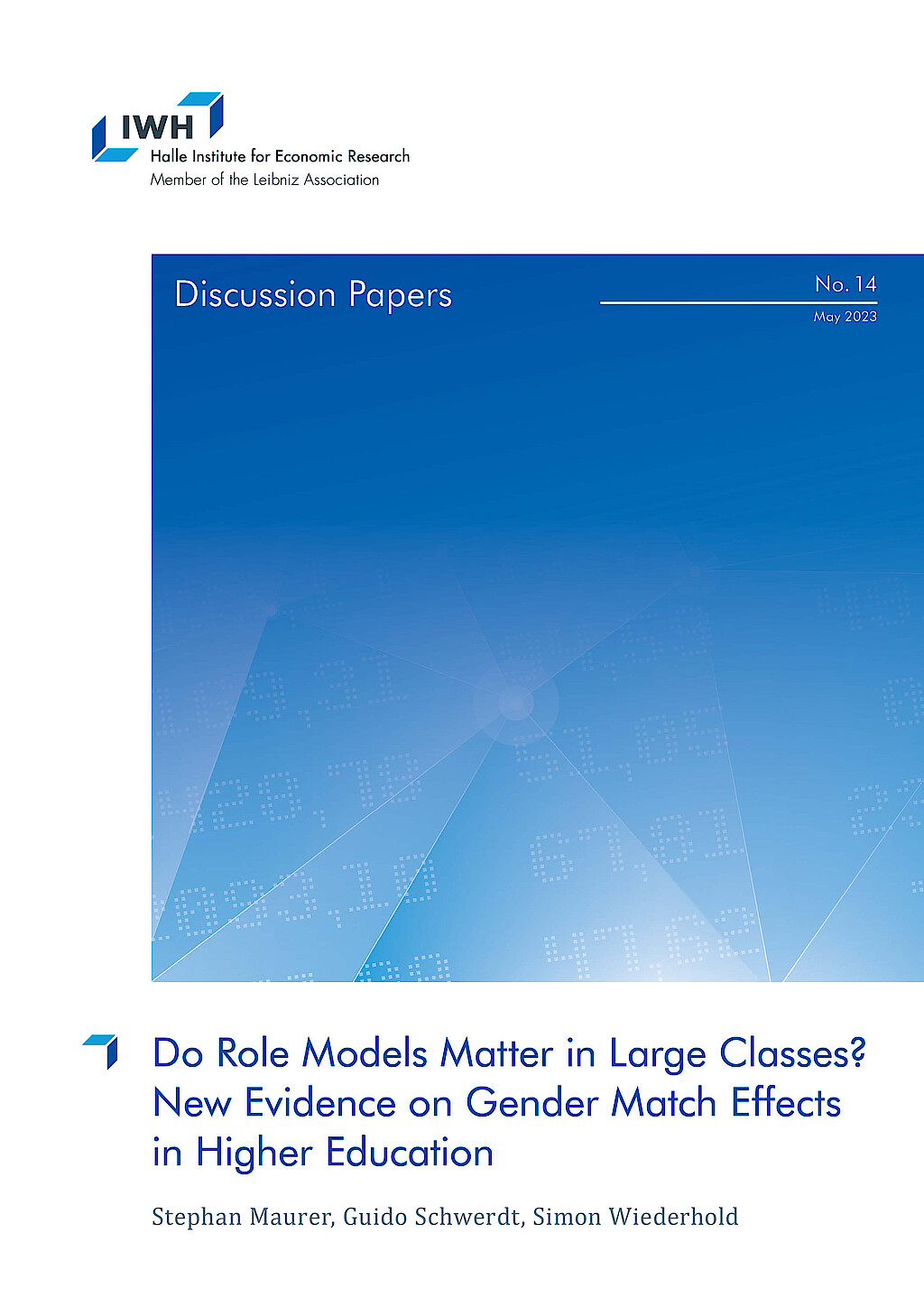
Do Role Models Matter in Large Classes? New Evidence on Gender Match Effects in Higher Education
in: IWH Discussion Papers, Nr. 14, 2023
Abstract
<p>It is well established that female students perform better when taught by female professors. However, little is known about the mechanisms explaining these gender match effects. Using administrative records from a German public university, which cover all programs and courses between 2006 and 2018, we show that gender match effects are sizable in smaller classes, but are absent in larger classes. These results suggest that direct and frequent interactions between students and professors are crucial for gender match effects to emerge. In contrast, the mere fact that one’s professor is female is not sufficient to increase performance of female students.</p>

Where Do STEM Graduates Stem from? The Intergenerational Transmission of Comparative Skill Advantages
in: IWH Discussion Papers, Nr. 13, 2023
Abstract
<p>The standard economic model of occupational choice following a basic Roy model emphasizes individual selection and comparative advantage, but the sources of comparative advantage are not well understood. We employ a unique combination of Dutch survey and registry data that links math and language skills across generations and permits analysis of the intergenerational transmission of comparative skill advantages. Exploiting within-family between-subject variation in skills, we show that comparative advantages in math of parents are significantly linked to those of their children. A causal interpretation follows from a novel IV estimation that isolates variation in parent skill advantages due to their teacher and classroom peer quality. Finally, we show the strong influence of family skill transmission on children’s choices of STEM fields.</p>
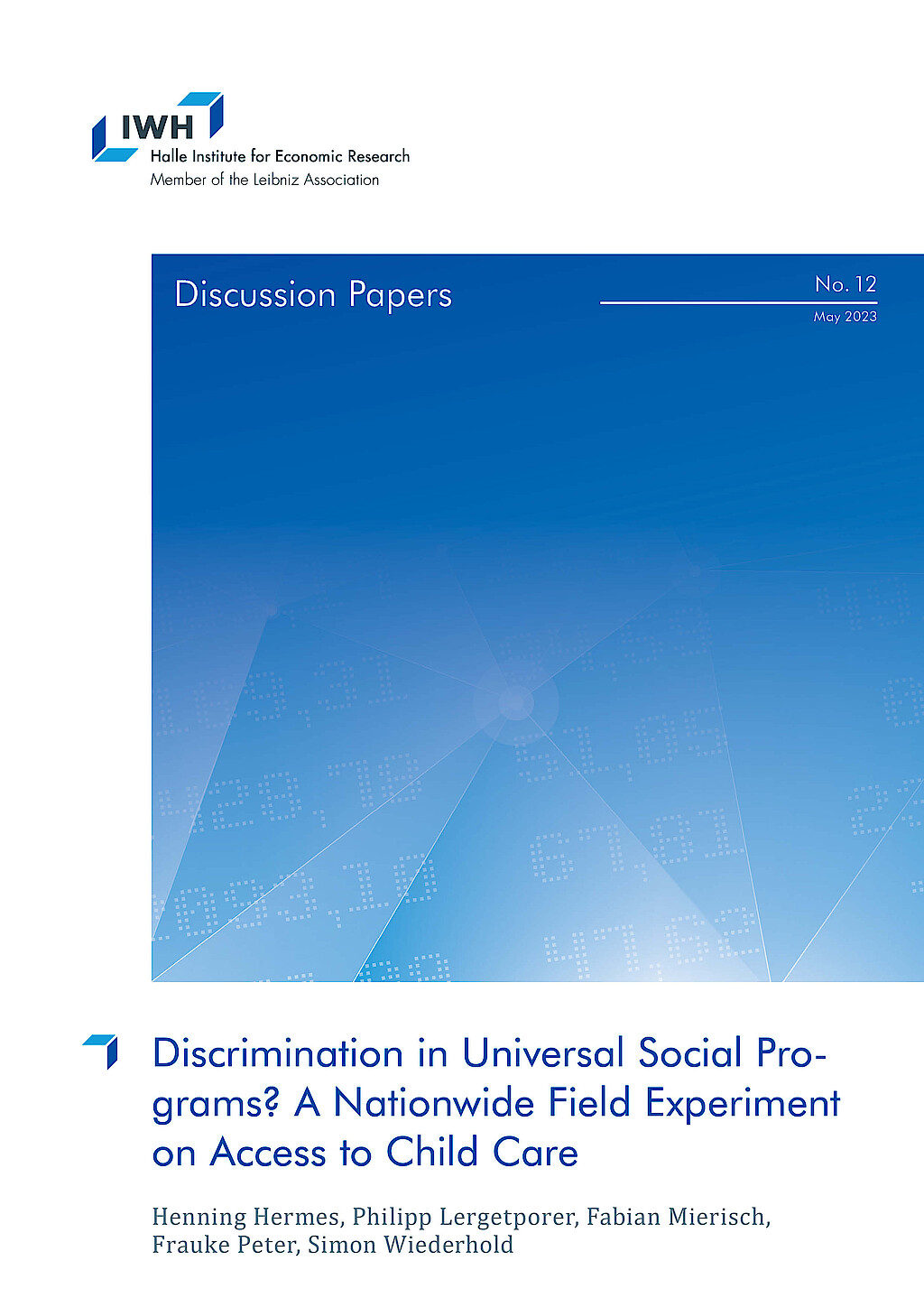
Discrimination in Universal Social Programs? A Nationwide Field Experiment on Access to Child Care
in: IWH Discussion Papers, Nr. 12, 2023
Abstract
Although explicit discrimination in access to social programs is typically prohibited, more subtle forms of discrimination prior to the formal application process may still exist. Unveiling this phenomenon, we provide the first causal evidence of discrimination against migrants seeking child care. We send emails from fictitious parents to > 18, 000 early child care centers across Germany, inquiring about slot availability and application procedures. Randomly varying names to signal migration background, we find that migrants receive 4.4 percentage points fewer responses. Replies to migrants contain fewer slot offers, provide less helpful content, and are less encouraging. Exploring mechanisms using three additional treatments, we show that discrimination is stronger against migrant boys. This finding suggests that anticipated higher effort required for migrants partly drives discrimination, which is also supported by additional survey and administrative data. Our results highlight that difficult-to-detect discrimination in the pre-application phase could hinder migrants’ access to universal social programs.
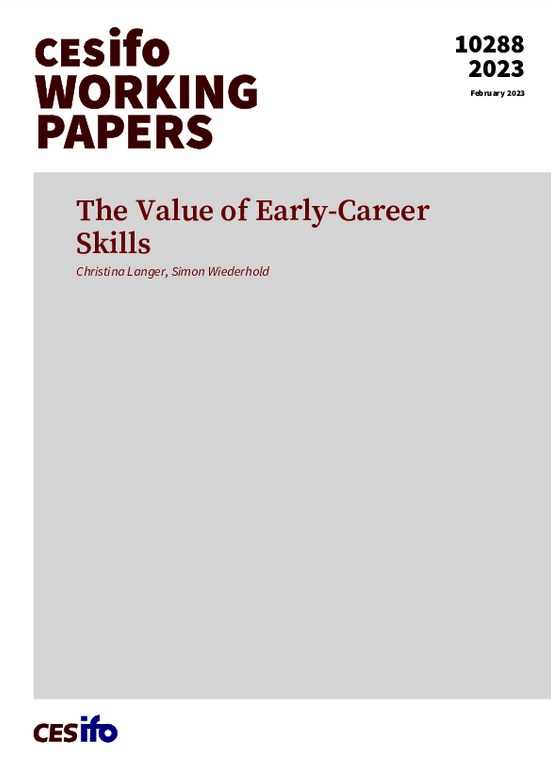
The Value of Early-Career Skills
in: CESifo Working Paper, Nr. 10288, 2023
Abstract
<p>We develop novel measures of early-career skills that are more detailed, comprehensive, and labor-market-relevant than existing skill proxies. We exploit that skill requirements of apprenticeships in Germany are codified in state-approved, nationally standardized apprenticeship plans. These plans provide more than 13,000 different skills and the exact duration of learning each skill. Following workers over their careers in administrative data, we find that cognitive, social, and digital skills acquired during apprenticeship are highly – yet differently – rewarded. We also document rising returns to digital and social skills since the 1990s, with a more moderate increase in returns to cognitive skills.</p>












